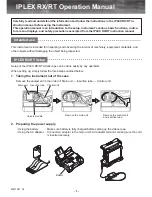
Function
Function
iso1685DP_D00272_03_M_XXEN/08.2017
10
3.3.1 Insulation monitoring
For insulation monitoring, a pulsating AC measuring voltage is superimposed onto the IT
system. The measuring pulse consists of positive and negative rectangular impulses of
the same amplitude. The period duration depends on the system leakage capacitances in
each case and the insulation resistances of the system to be monitored.
Abb. 3.1: Pulse sequence of the measuring voltage for insulation fault monitoring
An insulation fault between the IT system and earth closes the measuring circuit. If the in-
sulation resistance between system and earth falls below the set response values
R
an1
and
R
an2
(response value
R
an1
can be set equal or higher than
R
an2
), the associated alarm
relays K1 (11, 12, 14) or K2 (21, 22, 24) switch. Detected insulation faults are signalled to
other bus devices via the BMS bus. In addition, the alarm LEDs Alarm 1 or Alarm 2 light up.
3.3.2 Insulation fault location
For insulation fault location, a suitable locating current is superimposed onto the faulty
IT system with which insulation fault locators of the EDS… series can locate insulation
faults. The ISOMETER® utilises an internal locating current injector with
I
L
£ 50 mA DC.
Abb. 3.2: Pulse sequence of the internal locating current injector for insulation fault location
U
m
t
2 s
4 s
2 s
4 s
I
L
t
If the EDS function is activated, the ISOMETER® starts the insulation fault location after the
value has fallen below the response values
R
an1
and
R
an2
. When starting the insulation
fault location, the LED "PGH on" signals the locating current pulse.
When permanently installed insulation fault locators (with master capability) such as
EDS460-D or EDS490-D are used, control and synchronisation of the locating current in-
jector is carried out via the BMS master. For this purpose, the ISOMETER® and the insula-
tion fault locator have to communicate with the insulation fault locator via the BMS bus.
Parameterisation of the insulation fault location
By means of the BMS gateway, e.g. the COM460IP or the terminal program, different
modes can be selected via the BMS bus:
• off:
Switch off insulation fault location
• auto (automatic):
Factory setting = Insulation fault location and pause, alternately 5 minutes each.
During each pause, the device automatically switches to insulation fault measure-
ment
• on (permanent):
The locating current required for insulation fault location is permanently supplied to
the device
In addition, the value of the locating current required for insulation fault location can be
set to 1…50 mA via BMS.
3.3.3 Assignment of the alarm relays K1, K2, K3
K1 switches when the value falls below the alarm response value R
an1
(insulation resistance).
K2 switches when the value falls below the alarm response value R
an2
(insulation resistance).
K3 switches in the event of a device error or a connection fault.
During the insulation fault location process, the function of insulation re-
sistance measurement is deactivated and the coupling is disconnected
from the mains.











































